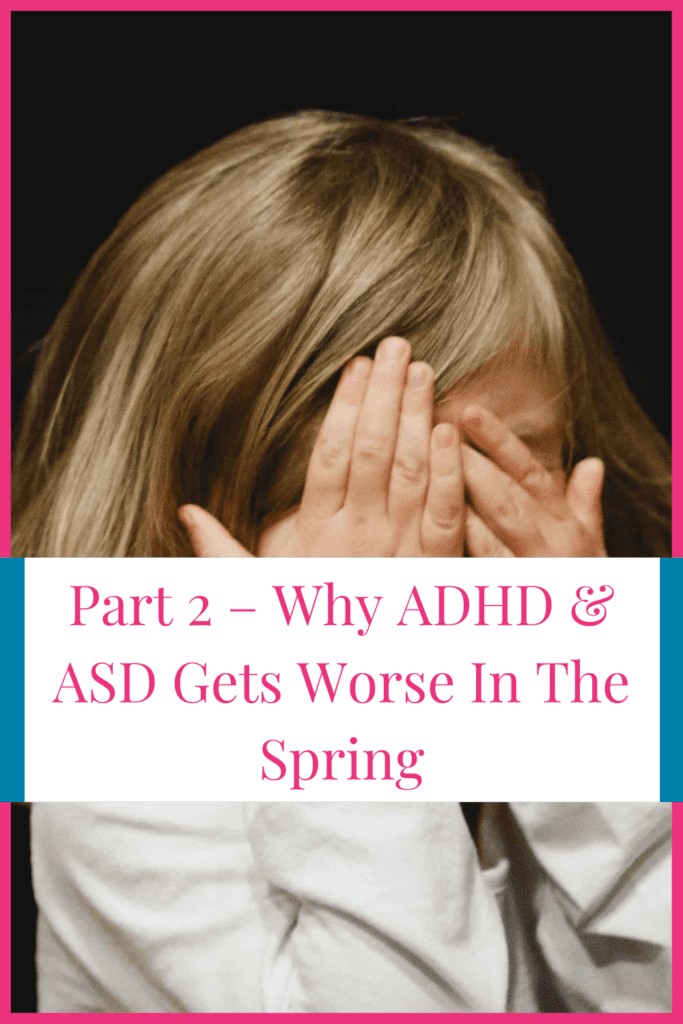Last week, I talked about why spring allergens can trigger a worsening in behaviour among children with ADHD and autism spectrum. At this point you may be wondering why your child is more vulnerable to seasonal allergens.
There are several factors that contribute to this so let me start with the one that I always address first with clients–and that is your child’s gut bacteria.
1.Gut Bacteria – I’ve mentioned previously that children with ADHD and autism spectrum have been found to have a significantly altered gut bacteria compared to neurotypical children. I myself have worked with many a child whose spring flares disappeared when we focused on healing and balancing the gut flora.
My own daughter had terrible sensory processing flares in the spring for years–before we realised candida was triggering some major histamine issues. Once we addressed yeast and other pathogens in the gut–she now goes through spring without a hitch.
A healthy gut bacteria is important for many reasons–one of them being that certain good bacteria help to break down histamines. If the gut flora is unhealthy or there is an imbalance then your child might have an overabundance of bacteria that actually produces histamine.
Gut bacteria is first place I start with clients–but not the only. While healthy gut bacteria helps to break down histamines, there are two enzymes known as DAO and HNMT whose key role is to manage and break down histamines.
2.Enzymes to Break Down Histamine – However, there are a few reasons why these enzymes might be low. These enzymes that break down histamine can be low simply because of poor nutrition or poor absorption of the nutrients that are required to manufacture these enzymes. Zinc, B12, vitamin C and several B vitamins are required for the production of these enzymes. If the gut is unhealthy then nutrient absorption will be compromised.
3.Poor Diet – A poor diet can also amp up the immune system which can trigger reactions to pollen, molds and various other environmental allergens. When these enzymes are low, your child’s histamine bucket gets too full–to the point of overflowing and a histamine reaction can occur. This can result in the typical allergy symptoms that we see in the spring to a sudden onset or worsening of behaviour, mental health issues and in some people even chronic pain. One more reason why addressing gut health and eating optimally is key.
Once again, remember that not everyone has the typical spring allergy symptoms even though they may have all sorts of other problems caused by high histamine. It all depends on the type of histamines that are released. For children with ADHD and autism spectrum–this can be H3 histamine that affects the brain.
So let’s go back to poor diet for a moment. Almost everybody has heard how children with ADHD and autism are more likely to react to food colouring. Want to know why? It’s simple. Food colouring triggers histamine release. So if your child already is vulnerable to having high histamine levels, toxins like food dyes will fill that almost full histamine bucket even higher. Keep in mind that many toxins in food can raise histamine levels among other things which is why it is super important to ensure these kids have a clean diet.
4.Genetics – The other factor that can affect histamine breakdown is that certain individuals have a genetic variant in which their bodies produce very low levels of the enzymes DAO and HNMT that break down histamines. This genetic variant doesn’t make the situation hopeless. I’ll explain more about what you can do to address that later.
5.MTHFR – The MTHFR gene is the gene that is often expressed among those with ADHD, autism spectrum and so much more. This gene is very much connected to a process called methylation which affects virtually every other process in the body. If there is a snip in this gene then breakdown of histamine can be affected as well.
Having this gene is not the end of the road. I have this gene, my husband has it and my daughter got both of ours. There are a lot of ways that you can turn down that gene’s expression–which I will mention next week. So don’t go blaming yourself or your mama for a ‘bad gene’.
Now that you understand the various reasons why your child might have issues with histamine and a worsening of behvaiour in the spring–next week we’ll talk more specifically about what you can do to manage their histamine levels and even heal their gut.
To learn more about how you can help your child rise above the challenges related to ADHD, autism spectrum and learning disabilities, hop onto my website and take the quiz to find out what exactly is at the root of your child’s struggles and check out my Youtube channel with tons of tips and tricks to improve learning and behaviour.
